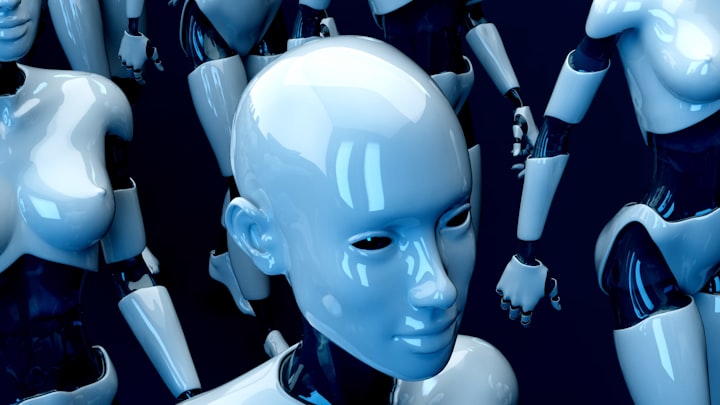The Fascinating Journey of Artificial Intelligence: From Simple Rules to the Unpredictable Singularity
Unveiling the Evolution of Artificial Intelligence: Seven Stages Explored

The Journey of Artificial Intelligence: From Rule-Based Systems to the Singularity
In a rapidly evolving world dominated by technology, understanding the stages of Artificial Intelligence (AI) becomes paramount. AI has come a long way, progressing through seven distinct stages that have reshaped our understanding of intelligence, cognition, and what it means to be human. In this comprehensive exploration, we will delve into each stage, from the humble beginnings of rule-based systems to the futuristic concept of the AI Singularity.
Stage One: Rule-Based AI Systems
At the dawn of AI, rule-based systems, also known as one-task systems, marked the first stage. These systems operated on predefined sets of rules or algorithms given by programmers. Imagine playing a game of chess against a computer – it evaluates all possible moves and outcomes based on its pre-coded rules to determine the best move. These systems excel at tasks with clear-cut rules, such as diagnosing mechanical problems or processing tax forms. However, their intelligence is confined within the given rules, lacking the ability to learn or adapt beyond them. They provide reliability and consistency but fall short when handling unforeseen scenarios.
Stage Two: Context Awareness and Retention Systems
Context awareness and retention systems represent a significant leap forward in AI development. These AI systems can understand and retain context, remembering previous interactions and using that knowledge to inform future responses. Personal smartphone assistants like Siri or Google Assistant exemplify this stage. They not only execute commands but also learn from past interactions, allowing for a more personalized user experience. Likewise, chatbots, like the renowned GPT, can generate human-like responses by utilizing context and retaining information from millions of previous conversations. These AI systems act like teenagers, possessing memory and context but lacking true independent thinking.
Stage Three: Domain-Specific Mastery Systems
Moving beyond context-aware AI, we encounter domain-specific mastery systems. At this stage, AI evolves to become highly proficient in specific domains or fields. Unlike stage two, which represents general context retention, domain-specific mastery AI excels in particular areas. IBM's Watson, designed for answering questions on Jeopardy, and Google's DeepMind AlphaGo, mastering the game of Go, exemplify this stage. These systems possess a deeper understanding of their specialized domains than any human could achieve, capable of analyzing vast amounts of data and making informed decisions at incredible speeds. While highly advanced, they are still far from attaining true artificial general intelligence.
Stage Four: Thinking and Reasoning AI Systems
In stage four, AI systems make significant strides in simulating human thinking and reasoning processes. Unlike earlier stages, these AI systems don't merely follow predefined rules or retain context. Instead, they attempt to mimic the human thought process. Achieved through techniques like machine learning and deep learning, these systems can comprehend complex concepts, solve unfamiliar problems, and generate creative ideas. Such AI could read a book, understand its plot, infer character motives, analyze economic data, anticipate market trends, and suggest investment strategies. While these AI systems resemble human intelligence more profoundly, they are still specialized in reasoning and thinking tasks, lacking the full range of human cognition.
Stage Five: The Birth of Artificial General Intelligence (AGI)
As we move into stage five, we encounter the realm of Artificial General Intelligence (AGI). AGI represents a theoretical type of AI that equals human intelligence in all aspects. An AGI system would possess the ability to understand, learn, adapt, and execute knowledge across a broad range of tasks. Unlike domain-specific mastery AI, AGI would not be limited to excelling in one area; it could perform any intellectual task a human can. Whether learning a new language, writing a symphony, solving complex mathematical theorems, or understanding human emotions, AGI should theoretically be able to accomplish it all. However, AGI remains a concept and has not been realized in practice yet.
Stage Six: Artificial Super Intelligence (ASI)
Entering stage six, we encounter Artificial Super Intelligence (ASI), which surpasses all previous stages in complexity and sophistication. ASI possesses cognitive skills far beyond human capabilities, making the definition of AI blurry. It can outperform humans in most economically valuable work and solve problems that humans cannot even fathom. ASI has the potential to offer solutions to global issues, innovate at an unprecedented pace, and provide insights beyond our current understanding. However, the arrival of ASI also raises substantial ethical and safety concerns, as its misuse or unintended consequences could have far-reaching implications.
Stage Seven: The AI Singularity
The final stage of our journey takes us to the concept of the AI Singularity. It is a hypothetical future point in time where technological growth becomes uncontrollable and irreversible due to the presence of ASI. The term "Singularity" was popularized by futurist Ray Kurzweil, borrowing from physics, where a singularity represents a point where known rules break down, such as the center of a black hole. In the context of AI, the Singularity suggests that ASI's capabilities are beyond human comprehension, capable of continually self-improving at an exponential rate.
The AI Singularity raises questions about the future of humanity, the potential merging of human consciousness with AI, and the profound impact on society. Some experts view the Singularity as a realistic possibility, while others consider it science fiction. The AI Singularity remains speculative and controversial, inviting debates about the nature of intelligence, the fate of humanity, and the role of technology in shaping our destiny.
In conclusion, the journey of AI through these seven stages showcases the remarkable progress made in the field of artificial intelligence. From rule-based systems to the concept of the Singularity, AI has challenged our understanding of intelligence, posed ethical dilemmas, and unlocked immense potential. As we venture into the future, the role of AI in shaping our world will continue to evolve, promising both opportunities and challenges that demand thoughtful consideration and responsible development. The journey of AI is far from over, and it is up to us to steer it towards a future that benefits humanity as a whole.






Comments
There are no comments for this story
Be the first to respond and start the conversation.